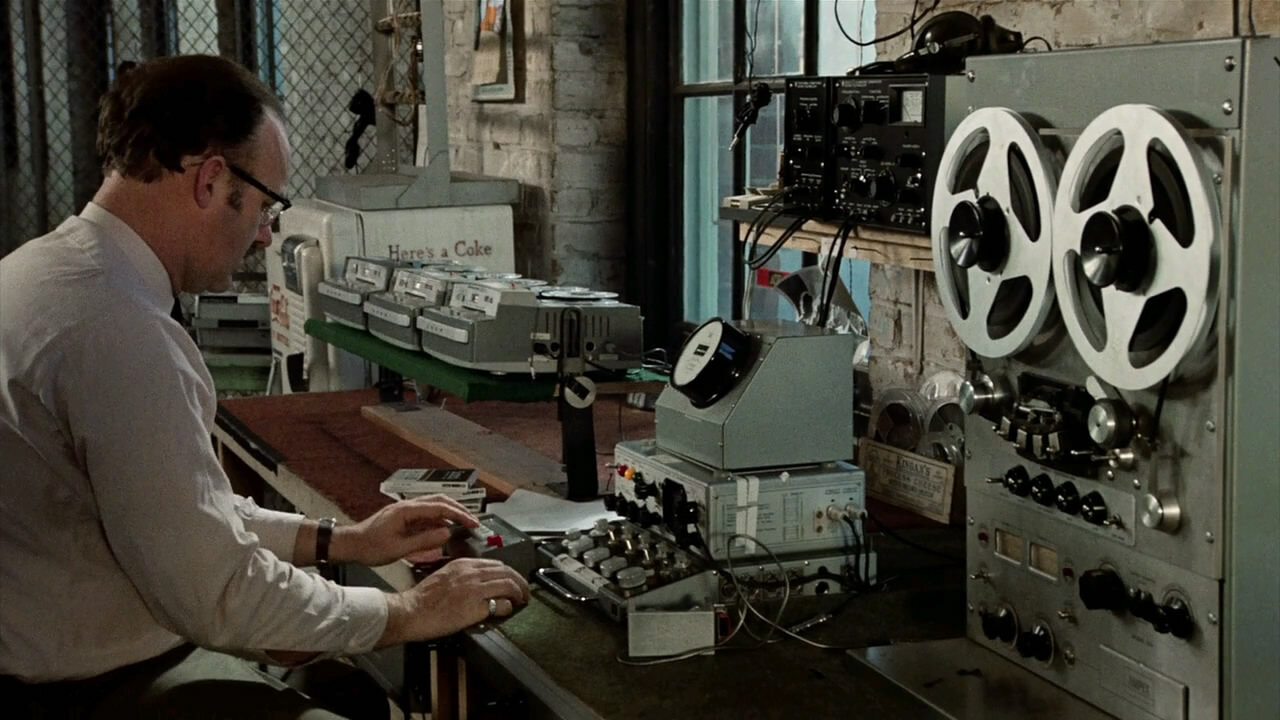The Conversation (1974)
![]()
Country: US
Technical: col 113m
Director: Francis Ford Coppola
Cast: Gene Hackman, John Cazale, Allen Garfield, Frederic Forrest
Synopsis:
A surveillance expert pre-eminent in the field of remote sound recording is tormented by the possibility that a recent assignment may result in the deaths of the parties concerned.
Review:
Coppola having fun after the grand canvas of The Godfather doing a small-scale psychological piece. His screenplay borrows from Blow Up, and his aesthetic from European films in general, while embedding the narrative in the febrile atmosphere of mistrust that preceded Watergate (of which it was uncannily prescient). It's a technical tour de force, largely due to Walter Murch's editing and sound design, with a simmered down central performance, but the ending is a Don't Look Now twist which both irritates and is instantly forgotten. The story of a private, even repressed, Catholic misanthrope who develops a soft centre by becoming emotionally involved in his work, is suddenly turned into a mug's game (thanks to an egregious bit of cheating via a re-recorded line of dialogue). Such is Coppola and Murch's work in conjuring up Caul's psychological state, however, that each time you view the film you are drawn into his world view, and become the sap once again. It's a cinephile's practical joke akin to Brian De Palma's, only less meretricious.
![]()
Country: US
Technical: col 113m
Director: Francis Ford Coppola
Cast: Gene Hackman, John Cazale, Allen Garfield, Frederic Forrest
Synopsis:
A surveillance expert pre-eminent in the field of remote sound recording is tormented by the possibility that a recent assignment may result in the deaths of the parties concerned.
Review:
Coppola having fun after the grand canvas of The Godfather doing a small-scale psychological piece. His screenplay borrows from Blow Up, and his aesthetic from European films in general, while embedding the narrative in the febrile atmosphere of mistrust that preceded Watergate (of which it was uncannily prescient). It's a technical tour de force, largely due to Walter Murch's editing and sound design, with a simmered down central performance, but the ending is a Don't Look Now twist which both irritates and is instantly forgotten. The story of a private, even repressed, Catholic misanthrope who develops a soft centre by becoming emotionally involved in his work, is suddenly turned into a mug's game (thanks to an egregious bit of cheating via a re-recorded line of dialogue). Such is Coppola and Murch's work in conjuring up Caul's psychological state, however, that each time you view the film you are drawn into his world view, and become the sap once again. It's a cinephile's practical joke akin to Brian De Palma's, only less meretricious.
![]()
Country: US
Technical: col 113m
Director: Francis Ford Coppola
Cast: Gene Hackman, John Cazale, Allen Garfield, Frederic Forrest
Synopsis:
A surveillance expert pre-eminent in the field of remote sound recording is tormented by the possibility that a recent assignment may result in the deaths of the parties concerned.
Review:
Coppola having fun after the grand canvas of The Godfather doing a small-scale psychological piece. His screenplay borrows from Blow Up, and his aesthetic from European films in general, while embedding the narrative in the febrile atmosphere of mistrust that preceded Watergate (of which it was uncannily prescient). It's a technical tour de force, largely due to Walter Murch's editing and sound design, with a simmered down central performance, but the ending is a Don't Look Now twist which both irritates and is instantly forgotten. The story of a private, even repressed, Catholic misanthrope who develops a soft centre by becoming emotionally involved in his work, is suddenly turned into a mug's game (thanks to an egregious bit of cheating via a re-recorded line of dialogue). Such is Coppola and Murch's work in conjuring up Caul's psychological state, however, that each time you view the film you are drawn into his world view, and become the sap once again. It's a cinephile's practical joke akin to Brian De Palma's, only less meretricious.
